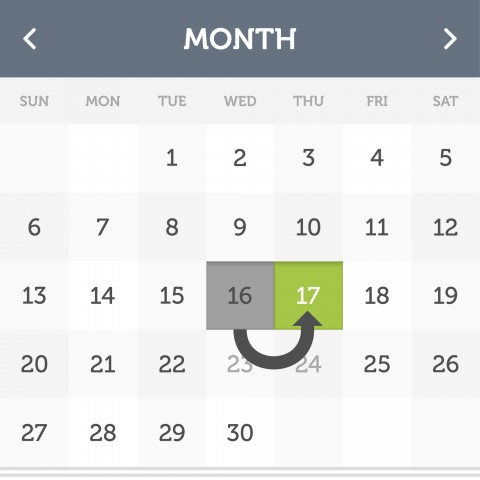

Greek tenses are a cornerstone chapter for every student of the language. They allow you to refer with ease to actions of the present, past, and future—a basic skill required for everyday discussions.
The good news is that the Greek tenses are very similar to those in English, making it easier to adapt. On the other hand, the bad news is that the Greek language features many different verb groups, as well as many exceptions.
In this blog post, we’ll demonstrate the use of Greek tenses and provide you with useful examples throughout.

Table of Contents

Talking about the present is one of the most common ways to describe your current actions, your hobbies, and your habits. There are two Greek present tenses: Ενεστώτας and παρακείμενος.
Let’s take a closer look at each one of them below.

You know what they say: What’s in the past, stays in the past. However, talking about your past experiences can be a very good conversation starter.
Are you ready to tell your Greek friends all about your adventures?
Here are the three possible Greek past tenses for verbs: Αόριστος, παρατατικός, and υπερσυντέλικος.
➤ If you feel like digging into the aorist tense a bit more, check out our lesson Talking About the Past.
➤ Learn more about the imperfect tense by studying our lesson Reminiscing in Greek.

Making plans about the future is what keeps us going. In order to describe your future plans, you’ll definitely need the future tenses in Greek, including συνοπτικός μέλλοντας, εξακολουθητικός μέλλοντας, and συντελεσμένος μέλλοντας.
As you might have already noticed in the examples, some tenses make use of the auxiliary verb “έχω” in their structure.
More specifically, the present perfect and future perfect utilize the present tense of the verb έχω (ého) – “have,” whereas pluperfect utilizes the past tense of the same verb: είχα (íha) – “had.”
For your convenience, in the table below you’ll find all the forms of this verb.
| Παρακείμενος (Parakímenos) – Present Perfect | |
| εγώ (egó) – “I” | έχω διαβάσει (ého diavási) – “have read” |
| εσύ (esí) – “you” | έχεις διαβάσει (éhis diavási) – “have read” |
| αυτός / αυτή / αυτό (aftós / aftí / aftó) – “he / she / it” | έχει διαβάσει (éhi diavási) – “has read” |
| εμείς (emís) – “we” | έχουμε διαβάσει (éhume diavási) – “have read” |
| εσείς (esís) – “you” | έχετε διαβάσει (éhete diavási) – “have read” |
| αυτοί / αυτές / αυτά (aftí / aftés / aftá) – “they” | έχουν διαβάσει (éhun diavási) – “have read” |
As for the future perfect, the only thing that needs to be added is the preposition θα (tha) – “will.”
| Συντελεσμένος Μέλλοντας (Sindelezménos Mélondas) – “Future Perfect” | |
| εγώ (egó) – “I” | θα έχω διαβάσει (ého diavási) – “will have read” |
| εσύ (esí) – “you” | θα έχεις διαβάσει (éhis diavási) – “will have read” |
| αυτός / αυτή / αυτό (aftós / aftí / aftó) – “he / she / it” | θα έχει διαβάσει (éhi diavási) – “will have read” |
| εμείς (emís) – “we” | θα έχουμε διαβάσει (éhume diavási) – “will have read” |
| εσείς (esís) – “you” | θα έχετε διαβάσει (éhete diavási) – “will have read” |
| αυτοί / αυτές / αυτά (aftí / aftés / aftá) – “they” | θα έχουν διαβάσει (éhun diavási) – “will have read” |
Now, for the past perfect, we’ll need the aorist form of this verb, which is demonstrated below.
| Υπερσυντέλικος (Ipersindélikos) – Pluperfect/Past Perfect | |
| εγώ (egó) – “I” | είχα διαβάσει (íha diavási) – “had read” |
| εσύ (esí) – “you” | είχες διαβάσει (íhes diavási) – “had read” |
| αυτός / αυτή / αυτό (aftós / aftí / aftó) – “he / she / it” | είχε διαβάσει (íhe diavási) – “had read” |
| εμείς (emís) – “we” | είχαμε διαβάσει (íhame diavási) – “had read” |
| εσείς (esís) – “you” | είχατε διαβάσει (íhate diavási) – “had read” |
| αυτοί / αυτές / αυτά (aftí / aftés / aftá) – “they” | είχαν διαβάσει (íhan diavási) – “had read” |

In order to complete your knowledge of Greek verbs, you certainly need to study other conjugation factors, as well. More specifically, you should remember that Greek verbs conjugate according to person, number, mood, and voice.
This definitely perplexes things, but you don’t need to worry. Take a look at our Greek Verb Conjugations article in order to familiarize yourself with all the different conjugation factors.
Verb conjugation and tenses are the core of Greek grammar. For more information, check out the Intermediate and Upper Intermediate series on GreekPod101.com.
Greek grammar is vast, and it’s totally okay for you to feel a bit confused, especially if you’re a beginner. So, how would you feel if you had a personal teacher to guide you all the way through this grammar labyrinth? In addition to our great selection of free learning resources, we also offer a personalized service for our Premium PLUS members called MyTeacher, which allows you to enjoy a unique one-on-one learning experience!
Before you go, feel free to let us know in the comments if you still have any questions about Greek tenses. We’d be glad to help!